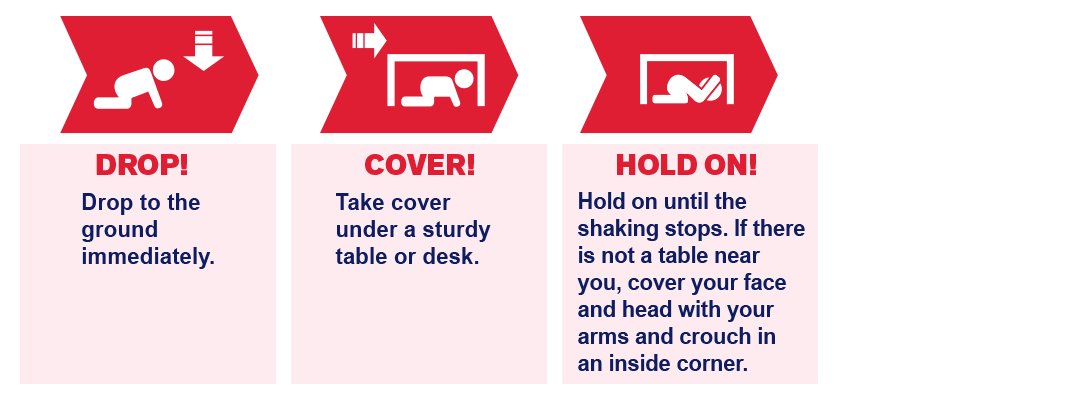Earthquake
There are two seismic zones that stretches through Illinois, which cause earthquakes in the state.
Seismic Zone

Tips to Help Prepare for an Earthquake
- Look around your area and decide where the safe spots are: under sturdy tables, desks, or against inside walls.
- Determine where the danger areas are: near windows, hanging objects, tall unsecured furniture (bookcases, cabinets, and appliances), and chemical sites. Most casualties in earthquakes result from falling materials.
- Store flammable and hazardous chemicals in proper cabinets.
- Keep breakables and heavy objects on lower shelves whenever possible. Make sure latches on cabinets, process tanks, storage tanks, and closets are secured.
During an Earthquake

- Drop!
Drop to the ground immediately. - Cover!
Take cover under a sturdy table or desk. - Hold On!
Hold on until the shaking stops. If there is not a table near you, cover your face and head with your arms and crouch in an inside corner. - If you are outside, move away from structures, power poles, or other possible hazards. Stay in an open area. During the shaking, DO NOT move for exits or attempt to leave the building, because heavy objects or debris may be falling.
- DO NOT stand in a doorway – it offers no greater protection.
- DO NOT use elevators.
After an Earthquake
- When the shaking stops, check for injuries to personnel in your area. DO NOT attempt to move seriously injured persons unless they are in immediate danger. Render first aid.
- Check the area for safety hazards. Begin evacuation procedures.
- Exit the building and go to the area designated by the UIC Police Department. Report injuries, damage, and potentially hazardous conditions.
- Be prepared for aftershocks. Earthquakes sometimes occur in a series of tremors, which could last for a period of several days. Each time you feel an aftershock, drop, cover, and hold on.
- Be alert for gas and water leaks, broken electrical wiring, downed electrical lines, or ruptured sewer lines. Whenever possible, turn the utility off at the source.
- Examine walls, floors, doors, staircases, and windows. Open cabinets cautiously and beware of objects that can fall off shelves. Clean up spilled medicines, bleaches, gasoline, or other flammable liquids immediately (use a Material Safety Data Sheet (MSDS) to determine proper cleanup).
- DO NOT reenter damaged buildings until they are examined and considered safe by emergency personnel.